Risk
The CALP Network’s State of the World’s Cash report found that the perception that CVA is riskier than other forms of aid was one of the main barriers to CVA being routinely used. This concern is linked to the growing emphasis from donors on anti-terrorism and money laundering, and shrinking budgets for humanitarian assistance. The CALP Network’s work under this theme aims to debunk myths, facilitate collaboration, and share learning to ensure that CVA is systematically and equally considered, based on evidence of actual risks across modalities.
Current priorities
A variety of organisations are currently working on CVA and risk. The CALP Network is working to identify synergies among actors, avoid duplication, and define joint priorities that can be better addressed collectively. Together with WFP, the CALP Network is co-leading the risk priority within the Grand Bargain workstream on cash.
Featured content
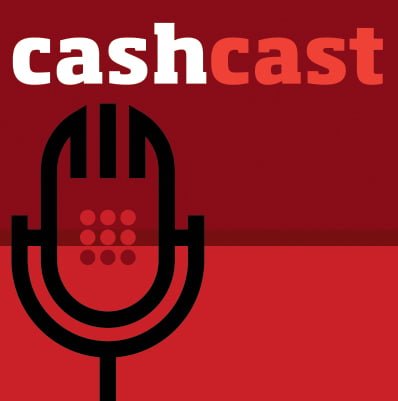
Podcast: Will risk aversion hold us back from realizing the potential of CVA?
Podcast
Episode 1 of the CashCast, exploring how attitudes to risk have impacted the use of CVA in the Middle East and North Africa region.

CVA and Risks: What happens in the field, stays in the field?
Blog Post
In October 2019 in Douala, Cameroon, the CALP Network facilitated a learning event exploring the risks to beneficiary protection in Cash and Voucher Assistance (CVA). This closed-door workshop, held as part of series of meetings and webinars on theme of CVA and risk in different regions, convened 25 humanitarian workers from West and Central Africa representing local and international NGOs, UN...

Webinar: Data sharing in CVA: ethics, ownership and privacy
Event
Thematic lead
Latest

Liberia Ebola Response
Presentation
ICRCs EVD Cash response program had to be designed under a rare circumstance of insufficient baseline data on EVD impact on household level and limited opportunity to contact intended beneficiaries for a detailed assessment/ proper situational analysis.
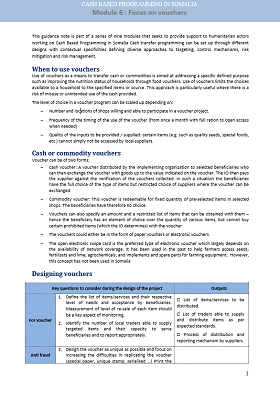
Cash Based Programming In Somalia – Module 6: Focus On Vouchers
Report
This guidance note is part of a series of nine modules that seeks to provide support to humanitarian actors working on Cash Based Programming in Somalia Cash transfer programming can be set up through different designs with contextual specificities defining diverse approaches to targeting, control...
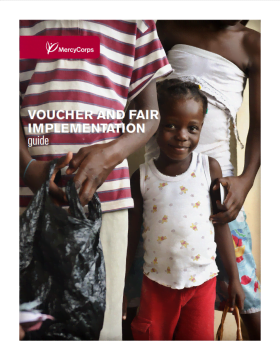
Voucher and Fair Implementation Guide
Guidelines and Tools
Mercy Corps’ Voucher and Fair implementation Guide provides clear, step-by-step guidelines for teams implementing cash, restricted cash, or commodity voucher programmes. Written for an internal audience, the Guide may also be useful for peer agencies.

Philippines Haiyan Response – A multi-sectoral review of the use of market analysis and the design and implementation of CTPs
Report
Following Typhoon Haiyan, which hit the Philippines on November 8 2014, at least 45 aid agencies chose to implement Cash Transfer Programming (CTP) to assist the more than 16 million people affected. Cash transfers were a logical approach in a country with developed market systems, strong financial...

Cash in Emergencies Toolkit
Guidelines and Tools
Access Toolkit Here Cash transfer based programming (CTP) is an effective and flexible way to support people affected by emergencies, maintaining their dignity and choice, while fostering local economies. CTP includes all forms of cash and voucher-based assistance. The Cash in Emergencies Toolkit has been...

A Review of Evidence of Humanitarian Cash Transfer Programming in Urban Areas: Annexes
Report
Annexes to accompany the working paper ‘A review of evidence
of humanitarian cash transfer programming in urban areas”

Protection Risks and Benefits Analysis Tool
Report
This tool provides global evidence on the protection risks and benefits of cash-based interventions, divided into key protection areas. It outlines the key questions that practitioners should explore to reach a context-specific, participatory identification of protection risks and benefits of a given...
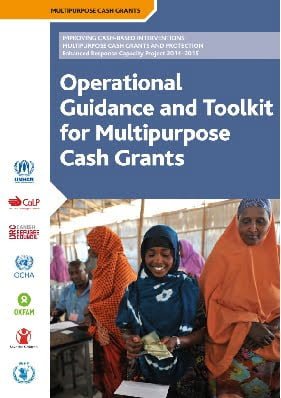
Operational Guidance and Toolkit for Multipurpose Cash Grants
Guidelines and Tools
This operational guidance and toolkit brings together worldwide expertise on cash-based interventions (CBIs). It provides comprehensive and practical guidance for humanitarian actors to assess the feasibility, conceptualise the design and structure the implementation of MPGs. The guidance focuses on...
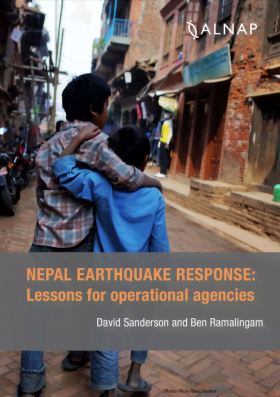
Nepal Earthquake Response: Lessons for operational agencies
Policy paper
In the aftermath of the April 2015 earthquake in Nepal, this paper looks at lessons drawn from previous comparable disasters and seeks to provide invaluable information and assistance to the operational agencies responding to the crisis. Seventeen Lessons give an overview of important learnings based on...

Privacy Impact Assessment of UNHCR Cash Based Interventions
Report
In 2014, the Office of the United Nations High Commissioner for Refugees (UNHCR) commissioned Trilateral Research & Consulting to conduct Privacy Impact Assessments (PIAs) of two of its Cash-Based Interventions (CBIs) in middle-income countries. The purpose of the PIAs was to help UNHCR assess the...

Integrating Cash Transfers into Gender-Based Violence Programs in Jordan: Benefits, risks and challenges
Report
With limited global practice and guidance on programming cash transfers to enhance protection in an emergency context, in 2013, the International Rescue Committee’s (IRC) started cash transfer programming (CTP) as part of the urban Women’s Protection and Empowerment (WPE) program in Jordan. Three...
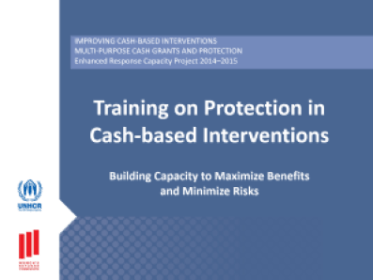
Protection in Cash-based Interventions Training: Building capacity to maximize benefits and minimize risks
Guidelines and Tools
This participatory curriculum is based on the inter-agency Guide for Protection in Cash-based Interventions (CBIs). The one-day training provides practical instruction for analysing and monitoring protection risks and benefits in CBIs. Slides, facilitators’ guide, case studies, and other materials for...
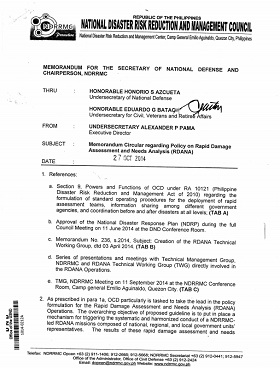
National Disaster Risk Reduction And Management Council
Report

Cash Transfers: Progress made but challenges remain
Blog Post
In five years cash programming has come from almost nowhere to being – for some donors at least – the preferred option, especially in the field of food and nutrition. “We no long measure food aid contributions in wheat/tons equivalent,” says Julia Stewart-David of the EU aid body, ECHO. “That...

Cash Transfers and HIV Prevention
Report
This paper proposes some initial principles on how to optimize HIV impacts of cash transfers, by encouraging targeting that: focuses on communities with high rates of new HIV infections, particularly acquired via sexual transmission; reduces local or community levels of economic inequalities between men...
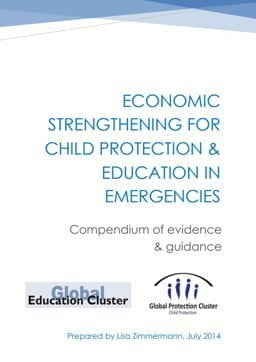
Economic Strengthening for Child Protection & Education in Emergencies
Guidelines and Tools
The aim of this compendium is to provide education and child protection coordinators and partners working in the field who are involved in or confronted with economic strengthening programmes with key existing evidence and guidance documents in order to inform their work, at all stages of a programme...

A Double-edged Sword: Livelihoods in emergencies guidance and tools for improved programming
Guidelines and Tools
This document aims to help economic development practitioners who design economic strengthening projects with the particular aim of improving child wellbeing and for others whose aim is poverty alleviation more broadly. The guidance presented is based on the understanding that: 1. Household economic...
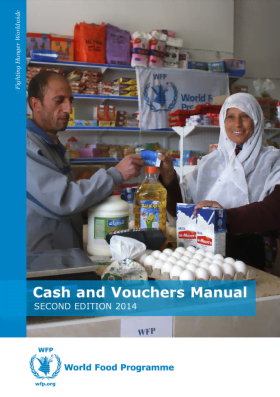
Cash and Vouchers Manual – Second edition
Guidelines and Tools
This second edition of the Cash and Vouchers Manual captures the latest corporately endorsed business processes and procedures, providing the most up-to-date tools (i.e. analytical, assessment, monitoring) that have been developed through close intra-departmental collaboration between Headquarters...
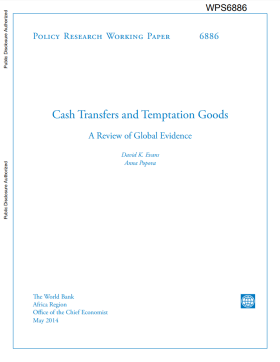
Cash Transfers and Temptation Goods: A review of global evidence
Report
Cash transfers have been demonstrated to improve education and health outcomes and alleviate poverty in various contexts. However, policy makers and others often express concern that poor households will use transfers to buy alcohol, tobacco, or other “temptation goods”. This paper reviews 19...
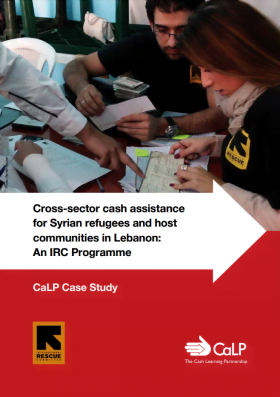
Cross-Sector Cash Assistance for Syrian Refugees and Host Communities in Lebanon: An IRC Programme
Report
Since January 2013, the International Rescue Committee (IRC) has been implementing a project providing humanitarian assistance to the Syrian refugees in Lebanon. This project provided unconditional financial assistance to targeted Syrian refugees and Lebanese host households to help them be better...



